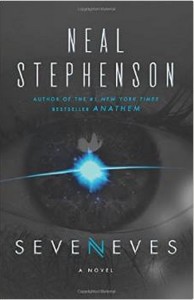 Of the half dozen or so Neal Stephenson novels I’ve read, Seveneves (pronounced seven Eves) is probably my least favorite. That might say more about how much I enjoyed his previous books. I need to make a few notes here while the book is fresh in my mind. [SPOILERS: If you haven’t read it yet, there will be a few] In no particular order:
Of the half dozen or so Neal Stephenson novels I’ve read, Seveneves (pronounced seven Eves) is probably my least favorite. That might say more about how much I enjoyed his previous books. I need to make a few notes here while the book is fresh in my mind. [SPOILERS: If you haven’t read it yet, there will be a few] In no particular order:
- If humans have any long-term future, it will involve space travel. And, if humans survive, they will evolve into beings that are different — in important, significant ways — from what we are today. Future humans will have god-like powers (genetic engineering, to name one)
- The story brings to mind The Martian (Andy Weir); Contact (Carl Sagan) and Red Star, Winter Orbit (A short story by William Gibson). And some clear echoes of Stephenson’s Anathem.
- Regarding the author’s choice for bringing about the end of the world: an unknown Agent blows up the moon which — within a couple of years — destroys all life on Earth. Not climate change; plague; nuclear war or alien invasion. And even though Stephenson chooses destruction by fire, he avoids the obvious Biblical reference.
- Stephenson made the “end of the world” seem real to me in a way that other apocalyptic tales have not. I found it difficult to read. He points out that “within about 100 years” everyone who is alive today will be dead. Something I never consciously considered.
- The story made me appreciate water and clouds and gravity in a way that I don’t think I ever have. I hope I don’t live to see the end of this world. Or the beginning of the end. Oops. Never mind.
- Robots figure prominently in this story but they are tools, not metal “people” No mention of Artificial Intelligence in this story. I came away with a feeling that this is how things will probably go. Not the romantic vision Hollywood has provided.
I’ve read most of NS’s novels more than once. Some so often the books have started to come apart. Seveneves is a good yarn but one read will probably be enough. Excellent review of 7Eves.
